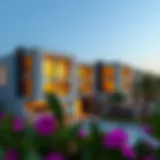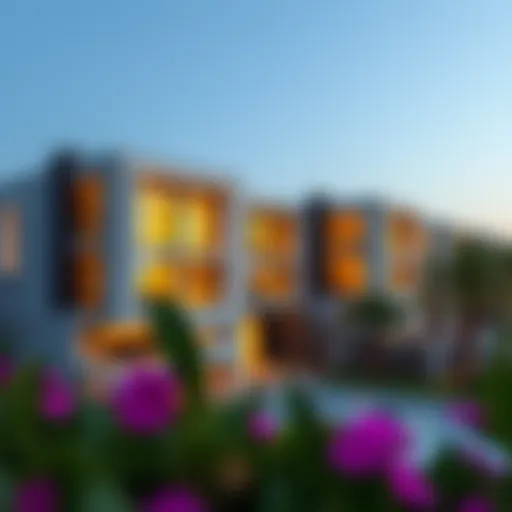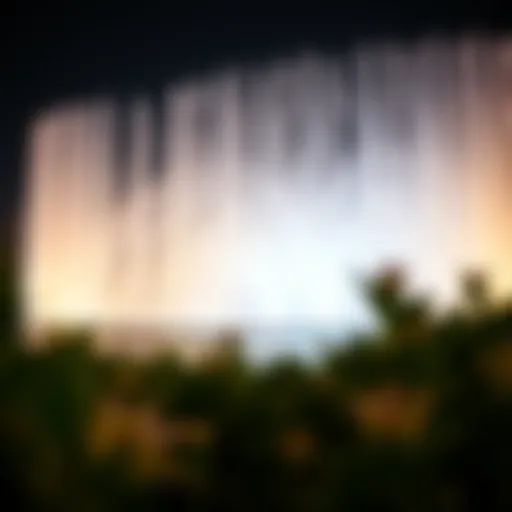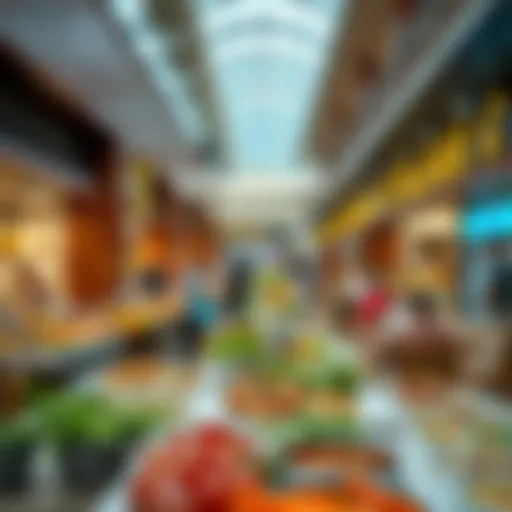Iftar Time in Dubai 2023: A Complete Guide


Intro
Iftar, the meal to break the fast during Ramadan, is not just about sustenance; it’s a communal experience rich with cultural significance in Dubai. With the 2023 Ramadan season approaching, the city’s vibrant atmosphere becomes adorned with crowd-pleasing culinary offerings and spiritual gatherings. For expatriates and residents alike, understanding the timing and traditions surrounding Iftar can greatly enhance the experience.
As the sun dips below the horizon, families and friends come together to share a meal, reflecting a spirit of generosity and togetherness. The warm evening air is filled with delightful aromas wafting from local eateries and homes where traditional dishes are served. This guide aims to shed light on the essentials of Iftar in Dubai this year, from when to break the fast to where to enjoy some of the best local offerings.
With Dubai’s rapidly growing expatriate community, the diverse culinary scene perfectly mirrors the melting pot of cultures that reside in this bustling metropolis. Understanding Iftar means more than just the ritual; it encompasses immersing oneself in local customs, savoring unique flavors, and creating a sense of belonging in this fast-paced city.
In the pages that follow, we'll explore Iftar timings, traditional dishes, popular dining spots, and tips that will help everyone make the most of this wonderful time. Prepare to dive into a community experience filled with discovery and delight as the lights twinkle and the call to prayer echoes across the Dubai skyline.
Market Insights
Current Trends
The trends surrounding Iftar in Dubai are anything but stagnant. In recent years, there's been a noticeable shift toward gourmet experiences, with many high-end hotels and restaurants curating lavish Iftar buffets that reflect both traditional dishes and global cuisines. Picture this: plush settings filled with diverse flavors, ranging from rich Arabic sweets to fusion dishes that incorporate ingredients from the expat community.
Additionally, there has been an uptick in the interest for home delivery and takeaway options, with various establishments offering Iftar boxes filled with an array of meals designed to cater to families. It works perfectly for those who may want to enjoy their meals at home or in outdoor settings rather than bustling restaurants.
Price Analysis
In terms of pricing, you can expect a variety of options, catering to different budgets. Traditional Iftar meals at local restaurants may start from around AED 50, whilst extravagant buffets in upscale venues can reach AED 300 or more per person. The best options blend affordability with quality, bringing more to the table without breaking the bank.
The cost can also be influenced by the location. Dining in areas popular with tourists may come with extra charges, but venturing slightly off the beaten path often leads to hidden gems offering authentic meals at reasonable prices.
To help you navigate your Iftar experience in a city that’s as diverse as its cuisine, consider planning your outings around the local trends. Not only will you see the beauty of community, but you’ll also enjoy a taste of the culinary diversity that Dubai has become famous for.
Understanding Iftar During Ramadan
Iftar stands as one of the most anticipated moments each day during the holy month of Ramadan. As the sun dips below the horizon, Muslims around the globe break their fast. In Dubai, a city synonymous with cultural fusion and culinary excellence, this moment is even more special. Understanding Iftar is vital in grasping the essence of Ramadan and how it shapes the fabric of society.
Definition and Importance of Iftar
Iftar is derived from the Arabic word "futūr," meaning breakfast. It signifies the meal that breaks the daily fast observed during Ramadan. The practice isn’t merely about fulfilling physical hunger; it embodies a spiritual journey. Traditionally, the fast is broken with dates and water, following a practice that extends back to the time of the Prophet Muhammad. The significance of Iftar transcends dietary restrictions. It fosters a spirit of community as families and friends gather, sharing food and moments of gratitude.
Notably, Iftar serves as the anchor point in a day of reflection and self-discipline. It’s an opportunity to foster connections, whether through communal meals at mosques or lavish dinners at Dubai’s restaurants.
- Social Gathering: The communal aspect reinforced during Iftar often leads to stronger bonds among communities.
- Charity and Generosity: Many engage in charitable acts, offering Iftar meals to those in need, which resonates with the broader principles of compassion in Islam.
Religious and Cultural Significance
Ramadan and Iftar represent more than just fasting; they serve as a transformative experience for individuals and families. Culturally, the atmosphere in Dubai comes to life as rooftops, parks, and homes fill with laughter and the aroma of traditional dishes. During this month, even the rhythm of daily life alters. The streets buzz with preparations as restaurants craft special Iftar menus, and community events spring up like mushrooms after rain.
One of the fascinating aspects of this period is how diverse cultural influences converge in the meals served. In a city where East meets West, you’ll find everything from Emirati dishes like shawarma to global cuisines in Iftar spreads.
“Iftar is not just a meal; it's a bridge that connects souls, blending flavors and traditions.”
Furthermore, Iftar encourages reflection on personal and communal values. The rituals associated with the meal, including prayers and acts of kindness, amplify the spiritual significance. In Dubai, the celebration of Iftar embodies a unique blend of modernity and tradition, inviting expats and visitors alike to partake in this fulfilling experience.
In essence, comprehending the deeper layers of Iftar contributes not just to a greater appreciation of Ramadan but also enhances the experience for everyone involved. Whether a local resident or a visitor, embracing the significance of Iftar paves the way for a more enriching connection to the city and its vibrant culture.
Iftar Time in Dubai: Schedule
Iftar represents a significant moment during Ramadan, marking the breaking of the fast at sunset. In Dubai, where the multicultural fabric is woven tightly, Iftar times embody not just religious observance but also a celebration of community and togetherness. Knowing the specific Iftar timings in 2023 is crucial for anyone looking to engage fully in the festivities. This schedule guides both residents and visitors, ensuring they can participate in the traditional evening meals without missing a beat.
Having a clear understanding of Iftar timing in Dubai allows people to plan their daily routines effectively, whether it's setting aside time for family gatherings or booking a table at a popular restaurant. This aspect of Ramadan can elevate one's experience, making each day a little more special as the sun sets.
Daily Iftar Timing Overview
In 2023, the Iftar timings in Dubai will vary throughout the month of Ramadan, primarily dictated by the sunset. Observing the local timings is essential. For instance, each day, the call to prayer signals that it's time to break the fast, often accompanied by families and friends gathering around a table laden with dishes, sharing stories and laughter.
Here’s an overview of the daily Iftar timings for the first week:
- Day 1: 6:40 PM
- Day 2: 6:41 PM
- Day 3: 6:42 PM
- Day 4: 6:43 PM
- Day 5: 6:44 PM
- Day 6: 6:44 PM
- Day 7: 6:45 PM


As you can see, there’s a gradual shift in timings, reminding fasting individuals of the beautiful rhythm of day and night. Notably, these times are approximate. It's recommended to check local authorities or community boards for precise timings, as variations can occur based on atmospheric conditions.
Comparison to Previous Years
When diving into the comparison between Iftar timings in 2023 to those in prior years, several factors play into this annual rhythm. Over the last few years, the Iftar times have adjusted slightly, with a general trend of longer fasting hours in recent years. Comparatively, in 2022, many noticed that Iftar occurred around 6:30 PM, making 2023's times a bit later, reflecting a small but meaningful shift in sunset timings.
- Iftar Timing in 2022: 6:30 PM
- Iftar Timing in 2021: 6:28 PM
This fluctuation isn't just numbers; they hold significance for those observing the fast. Longer fasting hours can lead to deeper reflections and appreciation for sustenance at Iftar, adding layers to spiritual observance.
As the sun sets a little later this year, it allows for a pause, a prayer, and a moment to connect with loved ones across the dining table. This changing dynamic over the years heightens awareness and enriches the overall experience.
It's not just about the food; it's about the community and traditions that bring people together.
As the month progresses, being informed about these evolving times can enhance participation in the cultural tapestry that defines Iftar in Dubai. Residents and visitors alike should embrace this experience, as it's a unique part of the UAE's identity during Ramadan.
Embracing the Ramadan Spirit in Dubai
The essence of Ramadan resonates profoundly within the heart of Dubai, where cultural traditions and community spirit intertwine seamlessly. Embracing the Ramadan spirit means not only understanding the significance of fasting but also celebrating the values that it represents – compassion, gratitude, and unity. In a city known for its extravagant lifestyle and modernity, Ramadan acts as a grounding force, bringing together people from varied backgrounds to partake in collective reflection and social responsibility.
Cultural Events and Activities
Throughout the month of Ramadan, Dubai offers an array of cultural events and activities that embody the spirit of the season. This includes the annual Ramadan Nights, held in various locations across the city, where families come together for evening markets. Stalls overflowing with traditional arts, crafts, and delicious cuisine create an inviting atmosphere. The sounds of laughter and chatter fill the air as people explore local artisans, sampling delectable delicacies that range from dates and succulent meats to aromatic sweets.
Moreover, the iconic Sheikh Mohammed Centre for Cultural Understanding often hosts iftar gatherings where individuals can engage in conversations about Islamic traditions, partake in traditional meals, and learn about cultural practices. It’s an enriching experience, fostering mutual respect and understanding, especially for those who might be new to the culture or festival.
"In Ramadan, we discover our shared humanity and the unique stories that unite us."
Sharing charitable meals at community centers enhances the sense of togetherness. For instance, the Dubai Charity Festival sees an influx of volunteers helping distribute food packages to those in need, further illustrating the compassionate aspect of Ramadan.
Community Engagement During Ramadan
Community engagement is at the core of the Ramadan experience in Dubai. Local mosques open their doors to not just worshipers but also to visitors keen on understanding the significance of this holy month. Engaging with locals, attendees often witness the preparation for communal prayers, which build a palpable sense of belonging.
Various neighborhoods host communal iftar dinners, where people gather to break their fasts together. This generous act showcases the spirit of giving, as many offer their homes or community spaces, encouraging others to join in irrespective of their faith. For expatriates, these gatherings provide a unique opportunity to immerse themselves in local culture and foster friendships across cultural boundaries.
In addition, businesses regularly extend their support during Ramadan by launching initiatives aimed at community service—some even matching employee donations to charities that align with the values of the holy month. Engaging in such efforts not only strengthens community ties but also introduces the global citizens who live in Dubai to the values of empathy and communal responsibility.
In summary, embracing the Ramadan spirit in Dubai extends far beyond the act of fasting. It invites everyone into a community where generosity, cultural enrichment, and shared experiences flourish, leaving a lasting impact on the city’s diverse fabric.
Locations for Iftar in Dubai
Finding the right place to partake in Iftar is not just about food; it’s about experiencing the essence of Ramadan within the vibrant backdrop of Dubai. This city celebrates the holy month with fervor, and choosing the right location enhances the spiritual and cultural experience. Restaurants and cafes across the emirate transform into hubs of social interaction, where friends, families, and even strangers gather to enjoy the evening meal following a day of fasting.
Locations offering Iftar are not merely establishments for dining; they reflect a community spirit, promoting togetherness and shared beliefs. It's essential to consider the ambiance, menu selections, and special offerings that can significantly contribute to one's overall experience.
Popular Restaurants Offering Iftar Buffets
Dubai boasts a slew of restaurants that are well-known for their extravagant Iftar buffets, catering to a variety of palates and preferences. These buffets typically serve a range of traditional dishes alongside international cuisines, providing a delightful culinary journey. Here are a few must-visit spots for an Iftar buffet that stands out during the month of Ramadan:
- Al Fanar Restaurant & Café - Nestled in the heart of Dubai, this restaurant specializes in Emirati cuisine, serving dishes reminiscent of the region's rich heritage. Their Iftar buffet features local favorites like Harees, Dates, and the delicious Lamb Machboos.
- Asha’s Restaurant - A fusion of Indian flavors within a contemporary setting, Asha’s offers a delightful Iftar spread that includes delectable Kebabs, Biryani, and an array of vegetarian dishes. This place combines modern aesthetics with an authentic taste, making it a hotspot for food lovers.
- JW Marriott Marquis Dubai - This luxury hotel is known for its lavish culinary offerings. Their Iftar buffet features a palette of Mediterranean and Middle Eastern dishes. Guests can indulge in everything from grilled meats to sweet pastries while enjoying views of the stunning Dubai skyline.
- Rive Gauche - This upscale French brasserie is also worth a mention for those seeking a unique dining style during Iftar. The gourmet menu they offer combines classic French cuisine with local flavors, providing an interesting twist on traditional meals.
Unique Iftar Experiences: An Overview
Beyond standard dining experiences, Dubai offers several unique Iftar experiences that allow you to indulge in the spirit of Ramadan. Here are some noteworthy options:
- Desert Iftar - Picture enjoying your Iftar surrounded by the tranquil vastness of the desert. Some hotels and tour operators organize special dining experiences in the desert with traditional setups under the stars, featuring Bedouin-inspired buffets and activities like camel rides.
- Iftar on a Dhow Cruise - For a unique blend of culture and culinary delight, many companies offer special Iftar cruises on traditional wooden dhows. Guests can relish a buffet while enjoying the picturesque views of the Dubai Marina or the creek, enhancing their dining experience with the romantic backdrop of the city’s skyline.
- Iftar in the Park - Various parks across Dubai hold family-oriented Iftar events, often featuring community gatherings. Families can enjoy a picnic-style Iftar while kids partake in various activities. Events like these create a sense of community, allowing people to bond while breaking their fast together.
These experiences not only cater to individual cravings but also embrace the communal spirit of Ramadan, making the locations for Iftar in Dubai essential to the holistic experience of this holy month. Each option offers a chance to connect with friends and family while savoring the rich flavors of this impactful season.
Recommendations for Visitors
When visiting Dubai during Ramadan, understanding the nuances of Iftar can enhance your experience significantly. This period of fasting is not just a time for breaking bread; it’s an opportunity to connect with local traditions, culture, and community. Thus, visitors should take note of some key recommendations to fully embrace this unique cultural occasion without causing offense or misunderstanding.
Best Places to Experience Iftar
Dubai is renowned for its lavish dining scene, and during Ramadan, several venues stand out as exceptional spots to enjoy Iftar. Here are several recommendations worth considering:


- Al Fanar Restaurant – This establishment serves up authentic Emirati cuisine in a traditional setting. The Iftar buffet here includes dates, soup, salads, and a range of main courses that offer a true taste of local flavors.
- At.mosphere – Located on the 122nd floor of the Burj Khalifa, this spot provides not just delicious food but also breathtaking views. You'll find a special Iftar menu that focuses on contemporary versions of local dishes, giving a modern twist to classic flavors.
- Bubbalicious Brunch at The Westin – Known for its extravagant brunches, this hotel features a special Iftar buffet that caters to all palettes, including many international dishes.
- Essence at The Address Downtown – Here, guests enjoy gourmet Iftar with a view of the iconic Dubai Fountain. The menu balances traditional dishes with innovative cuisine, ensuring a delightful dining experience.
As you ponder over where to eat, also embrace the option of tented locations found throughout the city. These cater to large gatherings and offer communal dining experiences that enhance the social aspect of Iftar.
Tips for Non-Muslim Visitors
For non-Muslim travelers, navigating Ramadan customs can seem daunting but keeping a few guidelines in mind can ease the experience:
- Respect the Local Customs: While you'll find many restaurants are open, be mindful when eating or drinking in public during daylight hours. Many locals may find this disrespectful.
- Observe Fasting Times: Familiarize yourself with Iftar timings. If you’re in public spaces, wait until the call to prayer signals the end of the fast before consuming food or drink.
- Participate in the Community Spirit: Engaging in Iftar-related events and gatherings can be a rewarding experience. Even if you’re not fasting, share in the communal atmosphere by joining Iftar meals or visiting community events.
- Dress Modestly: During Ramadan, even local residents may opt for conservative attire. It’s considerate for visitors also to dress modestly, primarily if attending any community or cultural events.
- Be Patient and Understanding: Some services may take longer during Ramadan, so patience goes a long way. Understand that many people are fasting, which may affect their energy levels.
In summary, the Iftar experience in Dubai offers visitors a blend of culinary delight and cultural engagement. By choosing the right places and observing local customs, you ensure a respectful and enjoyable stay during this holy month of Ramadan.
Health Considerations During Ramadan
During Ramadan, a month where fasting is an integral part of daily life for many, maintaining one’s health becomes a critical focus. Fasting, while spiritually rewarding, can pose certain health challenges if not approached with care. It’s essential to understand the balance between spiritual observance and physical well-being. Considering factors such as nutrition, hydration, and sleep can play a vital role in not only enhancing one's fast but also ensuring a healthy experience throughout this holy month.
Maintaining Health While Fasting
Fasting, from dawn till sunset, means abstaining from food and drink for several hours. It’s a shift in routine that can impact one’s health. Here are several key points to consider for maintaining health during this period:
- Hydration is Key: As the sun sets and the fast is broken with Iftar, the body needs plenty of fluids. Dates and water are traditional choices, but ensuring a combination of water-rich foods, like cucumbers and melons, can help maintain hydration.
- Balanced Meals: After fasting all day, many might be tempted to feast post-Iftar. However, it’s important to consume balanced meals that include proteins, carbohydrates, and fibers. Incorporate a mix of lentils, chicken, rice, and salads to provide necessary nutrients without overwhelming the digestive system.
- Listen to Your Body: Everyone’s body reacts differently to fasting. Pay attention to signs of fatigue or excessive hunger and make adjustments where needed. It’s perfectly acceptable to break your fast with something light before enjoying a larger meal.
"Listen to your body; it's smarter than you think."
- Limit Sugars and Fried Foods: During Ramadan, traditional foods can often lean towards sugary or fried options. While they are certainly tempting, try to limit these in your Iftar meals. Overindulging can lead to a sluggish feeling, which can drain your energy and may disrupt your fasting schedule.
Iftar Meal Planning Tips
Planning your Iftar meals carefully will not only satisfy your cravings but also provide nutritional value. Here are some effective meal planning tips:
- Plan Ahead: Before Ramadan starts, having a few go-to recipes can save time and ensure you have nutritious meals ready. Consider dishes that can be prepared in advance or ones that can be cooked quickly after the fast ends.
- Diverse Menu: Aim to include a variety of dishes. Rotating between meat, vegetables, and grain-based meals will keep the experience interesting and nutritionally balanced. Don’t forget traditional favorites like lentil soup, hummus, and stuffed vine leaves!
- Snacks Are Beneficial: It can be helpful to prepare small snacks between the evening meal and the pre-dawn meal (Suhoor). Options like nuts, yogurt, or dried fruits can provide energy and are easy to prepare.
- Prepare for Suhoor: The pre-dawn meal can set the tone for your fasting day. Focus on slow-digesting foods like oats, whole grains, and proteins that will keep you fuller for longer.
Traditional Foods Served at Iftar
The act of breaking fast at Iftar is not merely about satisfying one’s hunger after a day of fasting; it’s a cherished cultural tradition steeped in rich flavors and communal bonding. In Dubai, the culinary landscape during Ramadan showcases a remarkable fusion of heritage and innovation. Observers witness both the spiritual and social dimensions of Iftar as families and friends gather around tables adorned with traditional dishes, celebrating the end of the day’s fast and sharing moments that are as enriching as the meals themselves.
Culinary Heritage of Dubai
Dubai’s culinary heritage is a tapestry woven through time, showcasing influences from various cultures. This is evident in Iftar offerings that reflect the luxury and diversity of the city. The blending of Middle Eastern, South Asian, and even Western cuisines create a unique experience. Traditional foods served at Iftar not only nourish the body but also tell stories of the region’s history.
For instance, the Arabian mezze is a staple, characterized by small plates of flavorsome dishes like hummus, tabbouleh, and falafel. These appetizers set the stage for the main meal, embodying the spirit of sharing and hospitality.
As the sun sets, you might find dates, often stuffed with nuts or drizzled with honey, being served alongside Qamar al-Din, which is an apricot juice that adds a sweet touch to the evening. Each bite is a nod to local traditions and seasonal ingredients, reinforcing the communal spirit that Ramadan embodies.
Additionally, the sharjah-style grills and biryani, often gracing tables at Iftar, represent the region's culinary evolution. The grills, typically marinated and cooked to perfection, evoke flavors deeply rooted in tradition, while biryani transports eaters through South Asian influences popular among expatriate communities.
"The food we eat isn’t just sustenance; it's a reflection of our identities and cultures- a symbol of our shared humanity."
Popular Dishes During Iftar
When it comes to specific dishes that define Iftar in Dubai, the list is nothing short of delightful. Some of the most cherished dishes include:
- Luqaimat: These sweet dumplings, often drizzled with date syrup, are a favorite during Ramadan. With a crispy exterior and soft inside, it’s a treat that tugs at the heartstrings of many.
- Samboosa: Fried or baked triangular pastries stuffed with various fillings, samboosa are often filled with spiced potatoes or minced meat, symbolic of the region's ability to adapt and incorporate flavors from various cultures.
- Hamour: A local fish that may be grilled or served in a spicy curry, Hamour is a great choice for those seeking a healthy yet flavorful option.
- Jasheed: A hearty fish stew infused with spices, this dish holds a special place during Iftar, highlighting the coastal influences that shape Dubai's gastronomy.
Incorporating these traditional dishes provides not only a celebration of flavors but also fosters a sense of belonging among residents and visitors alike. Each Iftar highlights not just the food itself but the communal act of sharing and generosity inherent in the spirit of Ramadan.
Whether you’re sampling from a lavish buffet at a local restaurant or enjoying a simple home-cooked meal, the flavors and stories of Iftar create an unforgettable culinary journey in Dubai.
Economic Impact of Iftar Celebrations
Iftar celebrations during Ramadan are more than just a time for breaking fast; they are a cornerstone of Dubai's economy, influencing various sectors significantly. This aspect of the holy month creates a unique fusion of culture and commerce. Ramadan transforms the city into a bustling hub of activity, affecting local businesses and tourism alike. Understanding the economic impact of these celebrations is essential as it reveals how deeply intertwined tradition and economic viability can be.
Boosting Local Businesses


The influx of both residents and tourists during Ramadan results in increased consumer spending, particularly in food and hospitality sectors. Restaurants and cafes roll out elaborate Iftar menus, often featuring discounts and promotional offers. It's common to see establishments decorated with lights and banners, drawing in families and groups seeking a communal atmosphere. Local markets flourish, with the demand for cooking essentials and traditional food items reaching a peak.
Key Points on Local Business Impact:
- Increased Footfall: Iftar attracts crowds, leading to longer queues and busier venues, significantly impacting cash flows.
- Job Creation: Many businesses will hire temporary workers to manage the influx, which can lead to a boost in seasonal employment opportunities.
- Networking and Partnerships: During Ramadan, many businesses engage in partnerships for events and catering, fostering a spirit of collaboration.
This cycle forms a perpetual loop in which local businesses not only survive but thrive during Ramadan, promoting a sense of community and shared experience.
Culinary Tourism During Ramadan
The culinary experiences offered during Iftar are a major draw for tourists eager to immerse themselves in local customs. Culinary tourism during this period isn't merely about the food; it is about the overall experience of gathering, sharing, and celebrating. Tourists often seek authentic experiences, and Iftar promises just that.
Highlights of Culinary Tourism:
- Food Festivals: Dubai hosts a plethora of food festivals featuring local cuisines and international dishes. Such events become hotspots for tourists who desire to explore culinary diversity.
- Iftar at Iconic Locations: Locations like the Burj Khalifa or Dubai Marina often offer unique dining experiences with stunning views, enticing many visitors. Dining with a view is a major selling point for these high-end dining options.
- Cultural Exchanges: Iftar meals often serve as opportunities for cultural exchange, where tourists meet locals and learn about the rich traditions associated with the meal.
Additionally, high-end restaurants like Al Mahara and At.mosphere provide exclusive Iftar options, catering not only to local clientele but also attracting international visitors. This confluence emphasizes the essential balance between heritage and modern culinary innovation.
“The Iftar experience in Dubai is not merely dinner; it is a rich tapestry woven from the threads of culture, community, and economic growth.”
The impact of Iftar spreads far beyond a single meal, aiding the economy in multifaceted ways and sustaining the fabric of Dubai's social and cultural landscape. It embodies more than just breaking fast—it serves as a celebration of life, community, and shared moments that reverberate through the local economy.
Tech and Innovation in Iftar
In the fast-paced world we live in, technology has woven itself into every fabric of our lives, and Ramadan is no exception. The significance of technology during Iftar, particularly in a bustling metropolis like Dubai, cannot be overstated. As more and more people seek both convenience and a sense of community, the integration of tech into Iftar celebrations has grown both essential and transformative.
Digital Platforms for Iftar Reservations
Gone are the days when one had to stand in line or call restaurants to secure a spot for Iftar. In 2023, various digital platforms have emerged, offering effortless booking options that cater specifically to the needs of the community during Ramadan. Apps like Zomato, Eat App, and ReserveOut allow users to view menus, read reviews, and secure reservations with just a few taps on their smartphones.
- Advantages of these platforms:
- Convenience: No more waiting in queues. A reservation can be made anytime, anywhere.
- Instant Access to Menus: Users can browse through different culinary offerings.
- Real-Time Availability: Check if a restaurant is already booked for the evening.
While these platforms are making life easier, it's vital for restaurants to optimize their listings to ensure visibility. This mutual relationship between diners and restaurants nurtures a healthy dining ecosystem during Ramadan.
Innovations in Food Delivery During Ramadan
Food delivery services are another significant player in this realm. Companies like Deliveroo and Talabat have ramped up efforts to cater to the increased demand for Iftar meals. In 2023, these services are not just about delivering food; they’re also designed to enrich the dining experience.
- Enhanced Features:
- Iftar Meal Bundles: Many restaurants are offering special Iftar packages that feature traditional dishes, such as dates, soups, and savory main courses tailored for breaking fast.
- Tracking Capabilities: Customers can now track their orders in real-time, adding an extra layer of convenience while they prepare to break their fast at sunset.
This fusion of meal delivery innovation and the celebration of Iftar signifies an evolving culinary landscape in Dubai. By embracing these technologies, both consumers and businesses can navigate the season more efficiently while keeping the spirit of togetherness alive.
"Technology enhances our Iftar experience, making it easier to connect with food and tradition in a modern way."
As we stride further into the future, it is crucial that these tech advancements continue to maintain the essence of community and cultural connection that is at the heart of Ramadan. The blend of innovation with tradition presents a unique opportunity for Dubai’s culinary scene as it evolves to meet the needs of its diverse population.
Culmination
As we draw this exploration of Iftar in Dubai to a close, it is crucial to underscore the multifaceted significance that this practice brings to the community and visitors alike. Iftar is not merely about breaking a fast; it embodies togetherness, reflection, and the essence of cultural exchange. In the bustling streets of Dubai, most local citizens open their doors to neighbors, and this spirit fosters a sense of belonging that stretches across diverse backgrounds.
Summary of Iftar in Dubai
This year’s Iftar embodies a blend of tradition and modernity, showcasing how such an ancient custom continues to evolve while preserving its core values. With timings anchored by sunset, it serves as a moment for unifying families and communities after a day of fasting. From numerous restaurants providing lavish buffets to smaller gatherings at homes, the Iftar experience is rich and varied, reflecting Dubai's own diverse culinary tapestry.
- Cultural Significance: Iftar is deeply rooted in Islamic tradition and serves as a reminder of the less fortunate, fostering acts of charity.
- Culinary Diversity: The menu during Iftar ranges from traditional dates and Arabic coffee to contemporary twists on global cuisines.
- Social Interaction: It creates opportunities to bond with friends and family, often shared over elaborate meals.
"Iftar goes beyond the dining table; it is a celebration of community and gratitude."
This unique blend of old and new makes Dubai an extraordinary place to celebrate Iftar during Ramadan.
Encouragement to Explore Dubai's Iftar Scene
For those looking to immerse themselves in this rich cultural fabric, venturing into Dubai's Iftar scene is a must. The city boasts a stunning variety of options, from high-end hotel buffets that dazzle the senses to quaint streetside eateries that offer the authentic taste of home-cooked meals. Whether you are a visitor or a resident, taking part in these gatherings helps to deepen your understanding of the local culture and reinforces connections with others.
- Discover Local Favorites: Attend community Iftar events or pop into local joints to taste authentic dishes.
- Participate in Charity Events: Many organizations hold events where attendees can contribute to community initiatives.
- Make Reservations: With the popularity of Iftar, especially in renowned restaurants, making reservations can save disappointment.
Exploring the breadth and depth of Iftar in Dubai opens a window into the heart of Ramadan. It cultivates an appreciation for the sacredness of the month, encouraging both reflection and celebration, and it fosters connections that linger long after the last date has been consumed.







